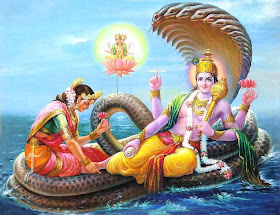Hari Charan
kabhin dekhaaihaau hari charan |
saman sakal kales kali-mal, sakal-mangal-karan ||1||
sarad-bhav sundar taruntar arun-baarij-baran |
lachhi-laalit-lalit kartal chhabi anoopam dharan ||2||
gang-janak anang-ari-priya kapat-batu bali-chharan |
bipratiya nrig badhikke dukh-dos daarun daran ||3||
siddh-sur-muni-brind-bandit sukhad sab kahan saran |
sakrit ur aanat jinhin jan hoet taaran-taran ||4||
kripaasindhu sujaan raghubar pranat-aarti-haran |
daras-aas-piyaas tulseedas chaahat maran ||5||
The Pure Feet of Hare or Lord Vishnu
O *Hare ! Will you ever give us darshan (vision) of your pure feet which annihilate all the afflictions and sins of Kaliyuga; and are the cause of our absolute salvation? ||1||
Goddess Lakshmi Pressing the Lotus Feet of Lord Vishnu
Their colour (of feet) is like the freshly blossomed bright red lotuses, which bloom in the autumnal season.They are pressed by the beautiful palms of goddess Lakshmi and are splendidly radiant, beyond comparison ||2||
The Feet of Sri Hari are the Father of River Ganges
They are the father of *Ganges (the feet of Lord Vishnu from which the Ganges emanates), are dear to Lord Shiva and
Kamdev, the god of Love
reduce Kamdev (god of love) to ashes.
The Vamana Avatara Steps onto King Bali
And they are the feet which tricked *Bali by adopting the guise of a deceitful brahmachari, and (released) Ahilya, brahman Gautam's wife and Raja Nriga (from curses and granted them supreme bliss),
Lord Krishna watches as Ekalavya offers His Thumb to Dronacharya
alleviated the sorrows and expiated the grave sins of violent *Nishada.
Siddhas, gods & sages Worship Lord Vishnu
Multitudes of *siddhas, gods and sages forever pray to them (Lord Vishnu's feet); who give joy and shelter to everyone; a bhakta is saved (from rebirth, in particular) on his own and can help others cross over the ocean of this material world by meditating upon them in his heart, just once. ||4||
The Lotus Feet of Sri Raghunath ji
O virtuous Raghunath ji, the ocean of mercy! You are the one who dispels the sorrows of those who seek refuge in you. This Tulsidas is yearning and ardently longs to catch a glimpse of those feet of yours. (Kindly protect him by quickly showing your lotus feet) ||5||
Hare: refers to Harati or He who unties the knot of material desires in this mundane world
Ganges: The River, emanating from the lotus feet of the Lord, inundates the heavenly planets, especially the moon, and then flows through Brahmapuri atop Mount Meru. Here the river divides into four branches (known as Sita, Alakananda, Cakshu and Bhadra), which then flow down to the ocean of salt water.”
Bali: was a demon king and the grandson of Prahlada who instilled in him a strong sense of righteousness and devotion. He was able to conquer the underworld and Heaven, which he wrested from Indra and the Devas. The Devas, after their defeat by Bali, approached Vishnu and begged him to restore their lordship over Heaven.
In Heaven, Bali, on the advice of his guru, Sukracharya, had begun the Ashwamedha Yagya so as to maintain his rule over the three worlds. Vishnu, meanwhile, had adopted the avatar of Vamana, a small Brahmin boy, and, during the rite, approached Bali and requested a grant of land which he could cover with three paces.
Vamana then grew to an immense size, and, with his first pace, traversed all of the earth and the underworld. With his second pace, he covered Heaven in its entirety. Admitting defeat, and seeing that Vamana has no more room for his last step, Bali offered his own head as a stepping-stone.
Bali was thus banished to the underworld.
Brahmachari: one of the four stages of life in traditional Indian civilization as outlined in the Manusmṛti. It refers to an educational period of 14–20 years which starts before the age of puberty. During this time the traditional vedic sciences are studied along with religious texts contained within the Vedas and Upanishads. This stage of life was characterized by the practice of strict celibacy.
Nishada: Ekalavya, the king of the Nishadas, always used to challenge Vasudeva Krishna to battle; but Ekalavya is later killed by Krishna during the latters conflict with Jarasandha's army. To be killed by Krishna is a mark, in Krishnaism (as in most forms of Vaishnavism), of exceptional divine favour. On the fourteenth day of the battle of Mahabharata, a much aggrieved Arjuna asks the cause of Lord Krishna's jubilation. the Lord replies, "O son of Kunti, if Ekalavya, the Nishada prince, were not killed by Me, he would have become unbearably powerful and aligned themselves with Duryodhana in order to fight with you. Therefore I inspired Drona to ask for the thumb of Ekalavya and I later killed Ekalavya in battle. It is my eternal duty to destroy anyone who disrupts the path of virtue."
Siddhas: those perfected & sanctified by penance









No comments:
Post a Comment